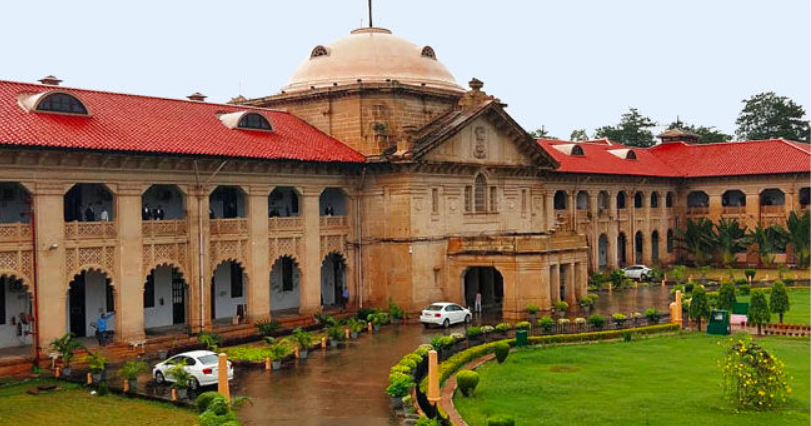“Allahabad High Court Deems 1993 State Order to Cease Hindu Prayers in Gyanvapi Mosque Cellar Unlawful”
The Court stated that the discontinuation of worship and rituals in the cellar by the Vyas family until 1993 was a result of an illegal action by the State without any written order. On Monday, the Allahabad High Court observed substantial prima facie evidence indicating that Hindu prayers were conducted in the southern crypt (Vyas Tehkhana) of the Gyanvapi mosque from 1551 until 1993 when they were halted.
Furthermore, a bench headed by Justice Rohit Ranjan Agarwal noted that the Uttar Pradesh government’s oral order in 1993 to prohibit these Hindu prayers was, on the surface, unlawful.
The Hindu party has presented a compelling case warranting a trial, and the balance of convenience also favors the plaintiff. The court stated, “The worship and rituals that the Vyas family continued to perform in the cellar until 1993 were halted by an unlawful action of the state in the absence of a written order.”
Referring to a 1937 civil court decision in the Din Mohammad case, the Court mentioned that it had accepted a map submitted by the State indicating that prayers were conducted in the cellar by the Vyas family.
The High Court also noted a 1996 Commissioner’s report mentioning a safeguard installed by Hindus on a gate in the Gyanvapi compound, further indicating Hindu ownership of the crypt in question (“Vyas Tekhana”).
“The existence of Vyas tehkhana (cellar) owned by Vyas family in the year 1937 is a prima facie proof of the continues possession claimed by the plaintiff till the year 1993,” according to the High Court.
However, the Court concluded that the Muslim party failed to establish even a prima facie case of ownership of the crypt between 1937 and 1993.
“The appellant’s (the Muslim party’s) failure to assert any claim to the cellar from the Vyas family between 1937 and December 1993 establishes a negative inference against them with regard to possession of the cellar.” “Since 1551, the Plaintiff has prima facie established their possession via the Vyas family,” the court stated.
Considering these factors, the High Court determined that allowing Hindu prayers in the southern crypt of the mosque through an interim order did not prejudice the Muslim party.
“At first glance, I conclude that the State Government’s prohibition of the Vyas family and devotees from engaging in religious worship and rituals since 1993 constituted an ongoing wrong,” the court stated.
The Court emphasized that the State cannot arbitrarily revoke a citizen’s fundamental right to freedom of religion, protected under Article 25 of the Constitution.
This observation was made in response to the Muslim side’s challenge to a Varanasi trial court order allowing Hindu prayers and puja to be performed in the southern crypt of the Gyanvapi Mosque, issued on January 31.
The trial court order was issued amid a civil lawsuit involving conflicting claims regarding the religious nature of the Gyanvapi compound.
The Hindu side alleges in the main suit that a portion of a temple in the Gyanvapi compound was demolished during the reign of Mughal emperor Aurangzeb in the seventeenth century.
On the contrary, proponents of Islam argue that the mosque existed before Aurangzeb’s tenure and underwent modifications throughout its history.
According to the Hindu perspective, the family of Somnath Vyas conducted Hindu prayers in the mosque’s cellar until 1993, when the government, led by Mulayam Singh Yadav, allegedly halted the practice.
The Muslim faction disputes this and maintains that the mosque structure has always been under Muslim ownership.
The High Court upheld the trial court’s ruling allowing Hindu prayers in the crypt pending a final verdict in the main suit.
The Court dismissed the Muslim party’s contention that Section 152 of the Code of Criminal Procedure (CrPC) was wrongly applied in the January 31 order.
The Court agreed with the Hindu party’s argument that the January 17 order inadvertently omitted reference to the resolution reached by the Hindu party in an application to designate a Receiver and permit Hindu prayers in the cellar of the mosque.
“The order dated 31.01.2024 stands covered under the powers of Court given in Section 151 and 152 CPC, as it is neither reviewing the order, nor the Court under the guise of invoking Section 152 is granting any further relief after the result of the judgment was rendered earlier,” according to the Court.
The Court also rejected the Muslim side’s claim that appointing a District Magistrate as the Court receiver, responsible for organizing prayers in the crypt, posed a conflict of interest.
“Once, the District Magistrate, Varanasi is performing his duties enumerated under the Temple Act, 1983, his appointment as Receiver by the Court who has to act on the direction and supervision of the Court would not lead to any clash of interest … Moreover, no malice in law or malice in fact, can be or has been imputed to the District Magistrate, Varanasi in the instant case,” according to the Court.
The Court subsequently dismissed the Muslim party’s appeal, stating, “I conclude that this Court is not required to intervene in the authorization of worship and rituals in the cellar, which is overseen by a Receiver appointed by the court below.” The Receiver had already acquired the crypt on January 24, 2024, and worship and rituals commenced on February 1, 2024.
However, the Court clarified that it has not yet ruled on the Hindu side’s arguments regarding the statute of limitations or the non-compliance of necessary parties, as the trial court has not framed these issues.
Senior Advocate SFA Naqvi, Syed Ahmed Faizan, and Zaheer Asghar represented the Muslim side, while the Hindu party was represented by attorneys Hari Shankar Jain, Vishnu Shankar Jain, Prabhash Pandey, Pradeep Kumar Sharma, and Vineet Sankalp.


